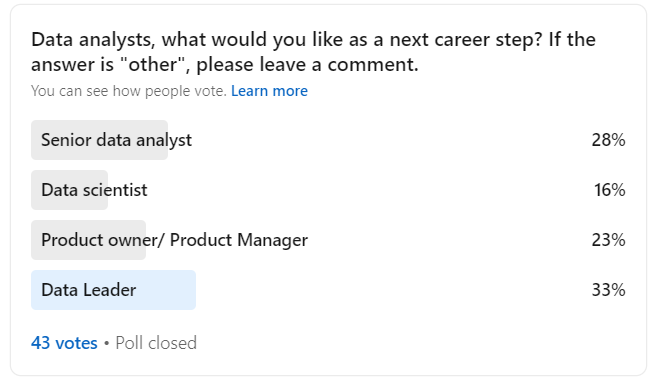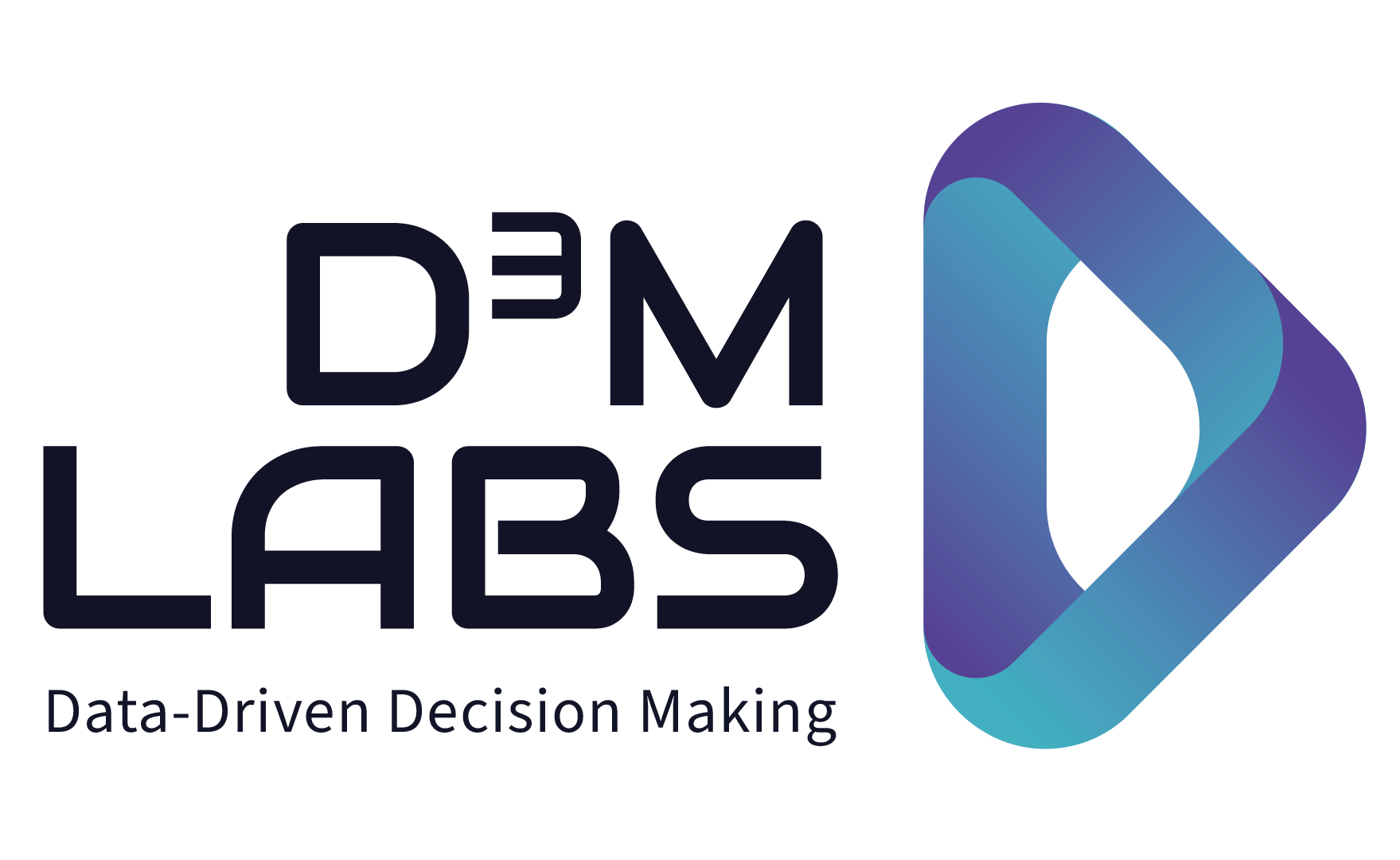Data analysts are often seen as nerdy introverts and dashboard producers, when in fact many of them are extroverted professionals with leadership ambitions who enjoy cross-functional collaboration – and coordination. Despite being the most visible, communicative position in the data world, career aspirations and professional development of data analysts are often neglected or based on faulty assumptions.
Career explorer reported that happiness of analysts ranks in the bottom 22% of all careers, mostly attributed to career development and ability to use their abilities to their fullest.
What do data analysts really want?
D3M Labs ran a poll over a week and followed up with the participants to ask them the reason behind their career aspirations. Although the numbers might not be statistically significant and there could be sampling bias, the study gave a clear signal that broader influence and cross-functional collaboration either as a senior anaylst or in a management function were the aspiratiosn of most respondents.
The results showed that:
Business expertise, coordination and influence were big drivers behind these career goals
Most of the analysts interviewed who wanted to either get into a more senior analyst role or move into a managerial function mentioned greater business understanding and impact, as well as coordination and influence as big motivational drivers.
- 28% want to become senior data analysts, 17% of those said they wanted to be analytics engineers.
- 56% want to move into a more managerial role, 33% wanting to become data leaders and 23% wanting to become product owners or product managers.
Data analysts whose career aspirations involved developing in a more technical direction either as a data scientist or an analytics engineer.
- 16% want to become data scientiest.
- 5% want to becoem an analytics engineer – taken from the 17% of data analysts.
D3M Labs Poll on LinkedIn

There are two major misconceptions that are holding analysts back:
Data analysts are perceived as introverts, but they are actually extroverts.
The people who want to remain data analysts are usually attracted by the communication and business-oriented aspect of the job. They enjoy being a bridge between departments. Communicating with stakeholders across the business was by far the point that most analysts saw as the most attractive part of their job.
Data analyst is often seen as a generalist and used as an entry point into data
The position of data analyst is often seen as a generalist position, and people start as a junior or mid-level data analyst as an entry point into data and decide after a year or so which direction they want to go. Many people who are in the junior and mid-level positions are actually burgeoning engineers would prefer data science. This hodge-podge of skills and interests often makes team focus on KPI visualizations and delivery of insights more difficult.
The pros of being a data analyst: Broad view of the company & always learning
Analysts I talked to in this study mentioned cross functional teamwork and ability to directly add value to a broad range of management decision making are also perks of the job. There was a self-view that they function as a bridge between departments that helped their stakeholders translate complex signals to succeed. Many analysts described themselves as curious and hungry to continuously learn and were motivated by the ability to get a broad view of the business as well as the data domain.
The cons of being a data analyst: Chaos and attitudes of other data professionals
Drawbacks of the jobs that respondents answered were lack of respect, chaotic environments, less pay and inability to take on more technically challenging jobs. Analysts mentioned the feeling that data scientists and data engineers look down on them and that stakeholders often treat them as a service function and data gophers.
The emergence of analytics engineers
Analytics engineer was a role that was mentioned to me as a path for data analysts who want to focus on the more technical part of the role. Some analysts who started as generalists found that the data pipeline interested them more than delivery.
Others were in teams where analysts worked in adhoc ways and were thus unclear as to what the role of an analyst was. Analytics engineer was a much clearer role. Higher pay and perceived job security and prestige due to technical nature of the role was part of the decision as well.
Breakdown of the results and drivers as mentioned by the respondents:
What do analysts want in the next 1-3 years? 43 responded. Moving into data leadership seemed to be the biggest wish, especially if you count that senior analyst responders included some analytics engineers as well.
Reasons for wanting to continue to develop into an senior data analyst (28%)
- Desire to gain a broad view of business decisions.
- Working on cross-functional projects, collaborating with a variety of stakeholders.
- Bringing insights and impact to stakeholders and the business.
- Communicating technical topics in an understandable way to non-technical stakeholders and thereby acting as a bridge between functions.
- Good for curious people who like learning, asking questions and communicating.
- Good for people who have research background.
Reasons for wanting to develop into an analytics engineer (this is a small subset of people who want to be senior analysts)
- Analysts who want to develop into a data engineering direction.
- Fascinated by the technology behind the business communications aspect of the jobs.
- Developing databases and data models involves creativity and problem-solving.
- Higher pay, job security.
Reasons for wanting to develop into a data scientist (16%)
- Ability to focus on one specific issue very deeply, longer-term projects.
- Usage of more advanced mathematics, machine learning, etc.
- Constantly evolving field, always learning.
- Will always be able to find good work anywhere they live.
- Higher salary and prestige
Reasons for wanting to develop into a product owner / product manager (23%)
- Broader influence over the organization.
- Interdisciplinary role where you get to work with designers, engineers, researchers, users, marketers, analysts, etc.
- Leadership role that allows you to work strategically.
- Allows for more self-drive and autonomy than many analyst positions.
- Job security, as it is hard to automate.
Reasons for wanting to develop into a data leader (33%)
- Broader influence on the organization and ability to work strategically.
- Building data teams, organizational & process architecture is interesting.
- Change cultures to be more inclusive, collaborative, and supportive.
- Mentoring others, helping others flourish.
- Higher salary, more prestigious.
What should data leaders, HR and executives learn from this poll? Analysts are generalist business managers as much as they are part of the data world
Stop looking at data analytics as a generalist role
Many of data analysts are extroverts who have leadership ambitions, also outside of their data teams. Instead of looking at data analysts as a generalist entry point into the analytics world, data analyst teams should be looked at as training grounds for the next generation of data-driven leaders.
Make the role less technical, hire for business savvy and communication
Data analysts should spend their time analyzing trends in the data and synthesizing the signals into impactful business insight. Data analysts should not spend hours putting together data pipelines, reading up on the most optimal way to write queries or other non-insights focused tasks. Hire analytics engineers or data engineers for those tasks. Use low code / no code to make life easier and technical aspects of analytics quicker.
Steps that leadership can take to develop data analysts
Analytics projects can become larger and data analysts can run them. Many strategic projects are cross functional in nature. Why not give the reigns to the data analyst?
Data analysts can run projects and even programs, be it business-oriented progrems, self-service analytics projects, programs that develop a company’s portfolio of advanced analytics and data science capabilities with commercially-minded slant or data education programs. The possibilities abound.
The options abound and should be focused on the interests of data analysts, but please don’t assume they don’t want to leave their dashboards and SQL code. And no not all data analysts aspire to be data scientists. Companies can support data analysts in developing digital marketing skills, product management skills, sales skills, design skills and more. Movement of data analysts into business strategy and business execution roles will make a company data-driven by design. A CEO with a data analyst background most have data be the heart of everything their company does, but really.
Related articles:
